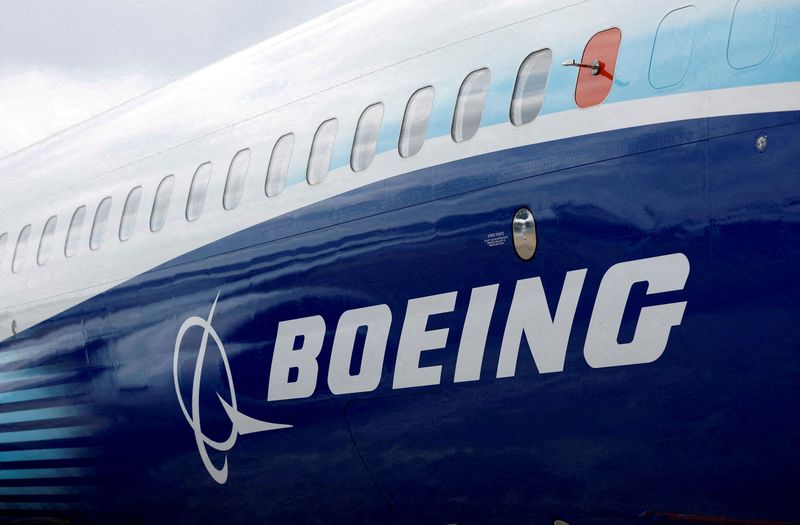By Rajesh Kumar Singh and Abhijith Ganapavaram
(Reuters) -Boeing Co on Wednesday warned its recovery from a crippling safety and economic crisis would take longer than expected after taking a $2.8-billion hit on loss-making defense contracts, sending its shares down sharply.
The heavy writedown came a day after Reuters reported a shake-up in operational management at the company's defense unit and unexpectedly drove the aerospace giant into a deeper loss in the third-quarter.
"Our path to recovery is taking a bit longer than expected, driven by the challenging macro environment," Chief Financial Officer Brian West said on an earnings call.
The company also cut estimates for 737 MAX deliveries this year as it wrestles with supply-chain disruptions, particularly delays in delays in jet engine deliveries.
Boeing (NYSE:BA)'s shares fell about 12% from the day's high. They were trading down 9% at $133.53 in afternoon trade.
The U.S. planemaker said supply constraints are not expected to get "much better" in the near-term and will persist through next year.
The Virginia-based planemaker is trying to emerge from overlapping crises - the pandemic and the grounding of its best-selling model after fatal crashes, which have left it with a pile of debt.
However, a run-up in costs in its defense contracts along with persistent shortages of parts and labor, and regulatory hurdles has made it tougher to shore up its fortunes.
Rising cost pressures over the last few months have hampered fixed-price contracts for U.S. aerospace and defense firms, prompting an industry body to ask the U.S. Congress for inflationary relief.
Since these contracts tend to have fixed prices, Boeing is required to absorb cost increases. Analysts at agency Partners estimates the company's various fixed price defense contracts have already resulted in of $8.8 billion of charges.
Chief Executive David Calhoun told investors the company is not "embarrassed" by the losses on its fixed price defense contracts.
"They are what they are, and we intend to deliver against these contracts and satisfy our customers," he said.
Boeing played down investor concerns that these contracts could result in more charges, saying the company was getting closer to finishing them.
Some analysts are not convinced, though. Vertical Research analyst Rob Stallard said the company's poor track record in forecasting defense charges raised questions over "whatever outlook the company provides".
"Boeing management continues to state that the company is in turn around mode, but we'd say that the arc of recovery remains extremely elongated," said Stallard, adding the company was lurching from one problem to the next in "whack-a-mole" fashion.
In a boost for the company, Alaska Airlines said on Wednesday it will buy 52 737 MAX aircraft for delivery between 2024 and 2027.
SUPPLY CONSTRAINTS
Boeing said demand for commercial planes remains strong, but tight supplies are hurting production. It further cut estimates for MAX deliveries this year. It now expects to deliver 375 planes this year, lower than an earlier target of "low 400s."
The company singled out delays in jet engine deliveries as the primary constraint in stabilizing and increasing production rates for 737 jets. It expects the aircraft's monthly delivery trend to remain in the low 30s next year.
It called supply chain "a key watch item" for the production and deliveries of 787 jets as well.
Boeing also faces a late December deadline for the Federal Aviation Administration (FAA) to certify the MAX 7 and MAX 10 under existing rules.
After that date, all planes must have modern cockpit alerting systems to be certified by the FAA, which would mean significant delays for the new MAX aircrafts' deployment unless Congress grants a waiver to extend the deadline.
Chief Executive Dave Calhoun said he is confident the planemaker will get an extension from the U.S. Congress of a key deadline to get the planes certified.
Boeing retained its forecast of generating cash this year after reporting a free cash flow of $2.9 billion in the September quarter, higher than $1.02 billion expected by analysts in a Refinitiv survey.

Adjusted loss per share in the third quarter widened to $6.18 from $0.60 a year ago. Analysts expected the company to report a profit of 7 cents a share.
Boeing has now fallen short of Wall Street earnings estimates for a fifth quarter in a row.